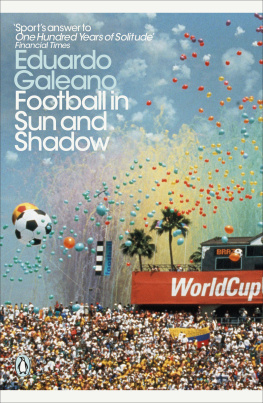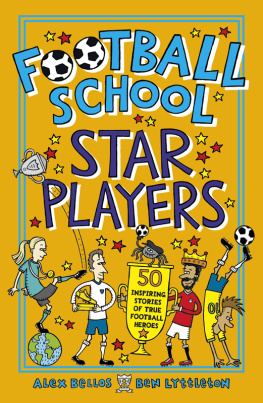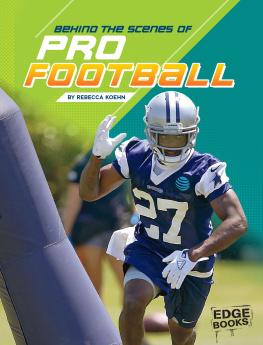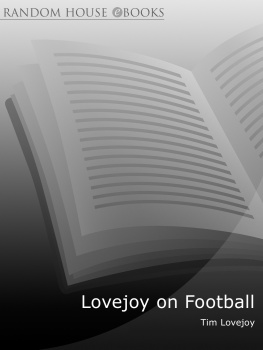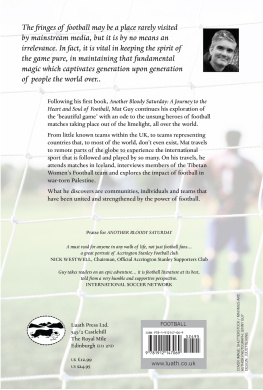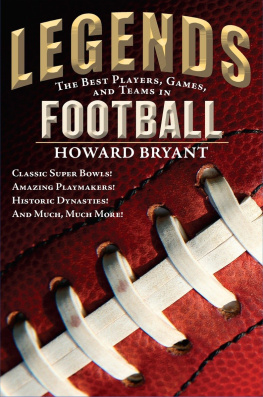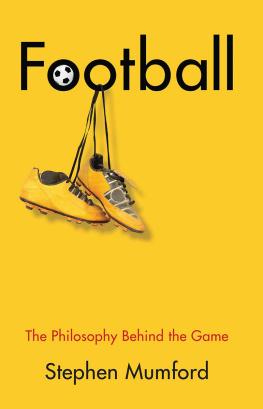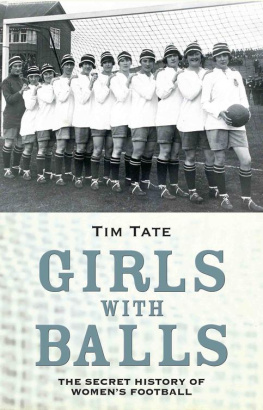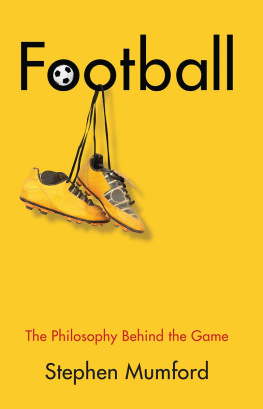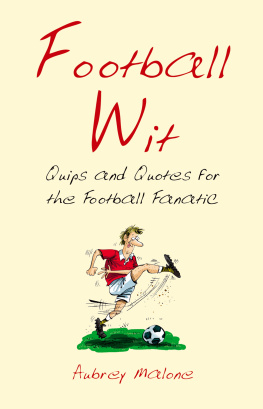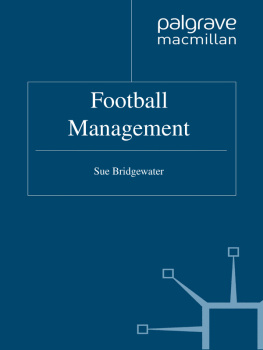PENGUIN MODERN CLASSICS
FOOTBALL IN SUN AND SHADOW
Eduardo Galeano was a Uruguayan journalist, novelist and writer, widely held to be one of Latin Americas most distinguished and admired literary figures. Born in Montevideo in 1940 to a modest middle-class Catholic family, Galeano published his first work a political cartoon in El Sol newspaper aged just fifteen. He went on to work for various weekly newspapers and magazines, and in 1971 he published his first book, the bestselling Open Veins of Latin America. Following his brief imprisonment during the Uruguayan military coup of 1973, Galeano fled the country: he lived in exile in Argentina and Spain for years before returning to Uruguay. His work including the celebrated Memory of Fire trilogy has been translated into twenty-eight languages, and during his lifetime Galeanos achievements as a writer were recognized with many literary prizes, including the hugely prestigious Casa de las Americas award. He died in 2015.
Eduardo Galeano
FOOTBALL IN SUN AND SHADOW
Translated by Mark Fried
PENGUIN CLASSICS
UK | USA | Canada | Ireland | Australia
India | New Zealand | South Africa
Penguin Books is part of the Penguin Random House group of companies whose addresses can be found at global.penguinrandomhouse.com.
First published as El futbl a sol y sombra by Siglo XXI Editores, S.A., and Ediciones del Chanchito 1995
First published in Great Britain by Fourth Estate 1997
First published in Penguin Classics 2018
Copyright Eduardo Galeano, 1995, 1997, 2003, 2009, 2013
Translation copyright Mark Fried, 1997, 2003, 2009, 2013
The moral rights of the author and translator have been asserted
Cover photograph: World Cup final match between Brazil and Italy, 1994 in Los Angeles
Photo Lutz Bongarts/Bongarts/Getty Images
ISBN: 978-0-241-35536-7
The pages that follow are dedicated to the children who once upon a time, years ago, crossed my path on Calella de la Costa. They had been playing football and were singing:
We lost, we won, either way we had fun.
Authors Confession
Like all Uruguayan children, I wanted to be a football player. And I played quite well. In fact I was terrific, but only at night when I was asleep. During the day I was the worst wooden leg ever to set foot on the little football fields of my country.
As a fan I also left a lot to be desired. Juan Alberto Schiaffino and Julio Csar Abbadie played for Pearol, the enemy team. I was a loyal Nacional fan and I did everything I could to hate them. But with his masterful passes El Pepe Schiaffino orchestrated the teams plays as if he were watching from the highest tower of the stadium, and El Pardo Abbadie, running in his seven-league boots, would slide the ball all the way down the white touchline, swaying back and forth without ever grazing the ball or his opponents. I couldnt help admiring them, and I even felt like cheering.
Years have gone by and Ive finally learned to accept myself for who I am: a beggar for good football. I go about the world, hand outstretched, and in the stadiums I plead: A pretty move, for the love of God.
And when good football happens, I give thanks for the miracle and I dont give a damn which team or country performs it.
Football
The history of football is a sad voyage from beauty to duty. When the sport became an industry, the beauty that blossoms from the joy of play got torn out by its very roots. In this fin de sicle world, professional football condemns all that is useless, and useless means not profitable. Nobody earns a thing from that crazy feeling that for a moment turns a man into a child playing with a balloon like a cat with a ball of wool, a ballet dancer who romps with a ball as light as a balloon or a ball of wool, playing without even knowing hes playing, with no purpose or clock or referee.
Play has become spectacle, with few protagonists and many spectators, football for watching. And that spectacle has become one of the most profitable businesses in the world, organized not for play but rather to impede it. The technocracy of professional sport has managed to impose a football of lightning speed and brute strength, a football that negates joy, kills fantasy and outlaws daring.
Luckily, on the field you can still see, even if only once in a long while, some insolent rascal who sets aside the script and commits the blunder of dribbling past the entire opposing side, the referee and the crowd in the stands, all for the carnal delight of embracing the forbidden adventure of freedom.
The Player
Panting, he runs up the wing. On one side awaits heavens glory; on the other, ruins abyss.
He is the envy of the neighbourhood: the professional athlete who escaped the factory or the office and gets paid to have fun. He won the lottery. And even if he has to sweat buckets, with no right to failure or fatigue, he gets into the papers and on TV. His name is on the radio, women swoon over him and children yearn to be like him. But he started out playing for pleasure in the dirt streets of the slums, and now plays out of duty in stadiums where he has no choice but to win or to win.
Businessmen buy him, sell him, lend him, and he lets it all happen in return for the promise of more fame and more money. The more successful he is and the more money he makes, the more of a prisoner he becomes. Forced to live by military discipline, he suffers the punishing daily round of training and the bombardments of painkillers and cortisone that hide his aches and fool his body. And on the eve of big matches, they lock him up in a concentration camp where he does forced labour, eats tasteless food, gets drunk on water and sleeps alone.
In other human trades, decline comes with old age, but a football player can be old at thirty. Muscles tire early: That guy couldnt score if the field were on a slope.
Him? Not even if they tied the keepers hands.
Or before thirty if the ball knocks him out, or bad luck tears a muscle, or a kick breaks a bone and it cant be fixed. And one rotten day the player discovers he has bet his life on a single card and his money is gone and so is his fame. Fame, that fleeting lady, did not even leave him a Dear John letter.
The Goalkeeper
They also call him doorman, keeper, goalie, bouncer or net-minder, but he could just as well be called martyr, pay-all, penitent or punching bag. They say where he walks the grass never grows.
He is alone, condemned to watch the match from afar. Never leaving the goal, his only company the two posts and the crossbar, he awaits his own execution by firing squad. He used to dress in black, like the referee. Now the referee doesnt have to dress like a crow and the goalkeeper can console himself in his solitude with colourful gear.
He does not score goals; he is there to keep them from being scored. The goal is footballs fiesta: the striker sparks delight and the goalkeeper, a wet blanket, snuffs it out.
He wears the number one on his back. The first to be paid? No, the first to pay. It is always the keepers fault. And when it isnt, he still gets blamed. Whenever a player commits a foul, the keeper is the one who gets punished: they abandon him there in the immensity of the empty net to face his executioner alone. And when the team has a bad afternoon, he is the one who pays the bill, expiating the sins of others under a rain of flying balls.

